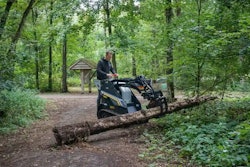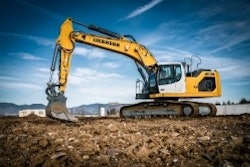Don’t let the fact that Sonny Abernethy’s company is less than three years old fool you. His $4.1-million company’s speedy growth underlines the fact Abernethy began Blue Ridge Industrial with a wealth of experience, not to mention industry contacts.
Abernethy started in the steel erection business during college, working summers for Tri State Erection in Greenville, North Carolina. He eventually signed on at Powell Construction in Johnson City, Tennessee, working for the company 31 years. Beginning as an ironworker foreman, he ended up as vice president of operations.
It was a great job, but then the company wanted Abernethy to move to Charleston, South Carolina. When family considerations prevented the move, Abernethy took the leap and started Blue Ridge. “It was a big pay cut,” he says with a jovial laugh that underlies his genial nature. “But I’m 57 years old and I enjoy working. And I love the construction business.”
Small went quickly by the wayside
Abernethy started out with the intention of creating a small steel erection company. “That didn’t last long,” he says. “I kept getting calls from people wanting me to do other stuff.” The company now performs a variety of industrial and commercial work.
These people knew Abernethy knew what he was doing. During his time at Powell Construction the company expanded its markets, getting into coal separation industrial plants and water and sewer facilities. “Each of these involved a tremendous amount of piping,” Abernethy says, “plus we had to build office buildings and shower facilities, so we did a lot of carpenter work too.”
And his hiring responsibilities at his former company let him know “who was available and what their skills were,” he says. “For a young, small company, we’ve got the best field personnel in the tri-city area. When I opened my doors, they came to me.”
Abernethy has gained some solid opinions from his extensive hiring experience. “I get out and look for people,” he comments. “When we go into a new area, the first thing I do is go to the high school and trade school guidance counselors and ask them who to hire. They’re tickled to death to help me.”
And he doesn’t believe in paying minimum wage, especially for the kind of construction work he’s asking new hires to do. In return, he asks each applicant a point blank question: Will they work?
Blue Ridge Industrial crews set the steel and precast concrete at this Johnson City Medical Center jobsite.
Getting credit
When you’re starting out, even with a mountain of experience behind you, it’s tough to get credit, Abernethy says. Past relationships become critical. “I’ve known Louis Jones, the manager of the Stowers Equipment branch for several years and went to talk to him. He said he’d work with us.”
Jones’ commitment was put to the test immediately. Thirty days afterward, Blue Ridge received three federal prison subcontracts in North Carolina. “I bought $150,000 in equipment from him in two weeks,” Abernethy remarks. “Without him trusting me, I would have had a hard time getting the equipment and building my credit.
“We hardly made any money on those jobs, but they allowed us to pay our bills and buy some equipment. And we were able to show a little profit after our first year.”
Abernethy means it when he talks about paying his bills. “We pay our bills within 30 days and people love you when you do that,” he comments. “It gives you tremendous ability. I can call up my vendors and ask them for something and they’re going to do their best to do it.”
A simple formula
Abernethy believes strongly in rental purchase options. “It’s the most efficient way to go,” he says. And he has a simple formula for rent versus buy: If a job can pay for at least 40 percent of the machine’s cost, he’ll buy instead of rent.
Still, “rental can actually be cheaper than owning when you factor in the upkeep of the equipment,” he says. “The bigger the equipment, the easier it is to justify not buying it.”
Abernethy’s equipment list includes several forklifts – both telescopic and straight mast – and aerial lifts. He also owns a dozer, excavator, skid steer and small crane along with a variety of ancillary equipment.
Growth and then some
Blue Ridge is already in its second facility, which it obtained when it bought the assets of a local construction firm. “We were looking for a place and this came along at the right time,” Abernethy says. “The assets also included quite a bit of equipment and since they were a general construction firm, it fit perfectly with ours.”
The firm has quadrupled its size since its first year in operation, which ended in August 2002. “This year will be a big transition year for us,” Abernethy says. “We’ve grown and now we have to maintain that growth and find more work.” Although he declined to give details, Abernethy is looking at further diversifying his markets this year.
“We strive to do what we say we’re going to do,” he says. “If you do that, people are going to want to work with you again.”
Others can attest to this philosophy. Skip Burleson, vice president of Burleson Construction in Johnson City, puts it this way: “Blue Ridge employees excel in what they do and Sonny is a great mentor and father figure. They are not afraid to take on difficult projects – they view it as a challenge. Through proper planning and attention to detail, the company gives its customers exceptional value for their projects.”
“Sonny’s ethics are top notch,” says Vicky Easly with Dillon Supply, another vendor Abernethy credits with helping him from the start. “His company is growing when others are going out of business. He’s known as the person to work for.”
Abernethy sees Blue Ridge growing to a $10 million to $15 million company within four years. “But,” he says with a shrug, “if it doesn’t fall into place, we’ll just keep on working because we don’t have any egos to support.”






